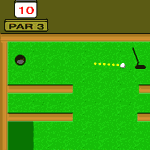MINI GOLF COURSE GAME TO PLAY ONLINE |
||||
|
||||
|
Mini
Golf Course - Miniputt Game Place your golf ball in the most convenient spot on the dark green mat at the begining of each hole. Click to drop the ball and move the mouse away from the direction you wish to shoot; a yellow line will show the direction and power of the shot. Click to shoot the golf ball. This free Golf Game will load in a new full screen window - re-size it to your preference. Golf is a outdoor game where each player plays his own small ball into a hole using various clubs, or, as defined in the Rules of Golf: "The Game of Golf consists in playing a ball from the teeing ground into the hole by a stroke or successive strokes in accordance with the Rules." Elements
of a golf course Many holes include hazards, namely bunkers (or sand traps), from which the ball is more difficult to play than from grass, and water hazards (lakes, ponds, rivers, etc). Special rules apply to playing balls that come to rest in a hazard which make it highly undesirable to play a ball into one. For example, a player must not touch the ground in a hazard with a club prior to playing a ball, not even for a practice swing. A ball in a water hazard may be played as it lies or may be replaced by dropping another ball outside the water, but a penalty is incurred in the latter case. The grass of the putting green is cut very short so that a ball can roll over distances of several meters, and "to putt" indeed means to play a stroke on the green where the ball does not leave the ground. The hole must have a diameter of 4 1/4 inches (108 mm) and a depth of at least 4 inches (101.6 mm). Its position on the green is not static and may be changed from day to day. This hole on the green has a flag on a pole positioned in it so that it may be seen from some distance (but not necessarily from the tee). It is also termed "the pin" and a hole is measured from the tee to the pin, usually in yards. The borders of a course are marked as such, and beyond them is out of bounds, that is, ground from which a ball must not be played. Special rules apply to certain man-made things on the course (obstructions) and to ground in abnormal condition. Every hole is classified by its par. The par of a hole is defined by the distance from tee to green. Typical values for a par three hole range from 130 to 230 yards (120-210 m), a par four hole from 300 to 475 yards (275-435 m), and a par five hole from 450 to 600 yards (410-550 m). Par is also the theoretical number of strokes that an expert golfer should require for playing the ball into any given hole. The expert golfer is expected to reach the green in two strokes under par (in regulation) and then use two putts to get the ball into the hole. Many 18-hole courses have approximately four par-three, ten par-four, and four par-five holes. The total par of an 18-hole course is usually around 72. At most golf courses there are additional facilities that are not part of the course itself. Often there is a practice range, usually with practice greens, bunkers, and a driving area (where long shots can be practiced). There may even be a practice course (which is often easier to play or shorter than other golf courses). A golf school is often associated to a course or club. Play
of the game Players usually walk (or sometimes drive) over the course in groups of two, three, or four, sometimes accompanied by caddies who carry the players' equipment and assist in playing. Each player has to play one ball from the tee to the hole. Once every player has brought a ball into play, it is always he or she whose ball is the farthest from the hole who is to play next. When all players of a group have completed the hole, that player who scored best on that hole has the honor, i.e. the right and duty to tee off first on the next. Each player acts as marker for one other player in the group, that is, he or she records the score on a score card. In stroke play (see below), the score consists of the number of strokes played plus any penalty strokes incurred. The two basic
forms of playing golf are match play and stroke play. In match play,
two golfers (or two teams) play every hole as a separate contest
against each other. The party with the lower score wins that hole,
or if the scores of both players or teams are equal the hole is
"halved" (drawn). The game is won by that party that wins
more holes than the other. In stroke play, every player (or team)
counts the total number of strokes for a set number of holes and
the party with the lower total score wins. There are many variations
of these basic principles, some of which are explicitly described
in the "Rules of Golf" and are therefore regarded "official".
Author: Mini-Putt |
||||
